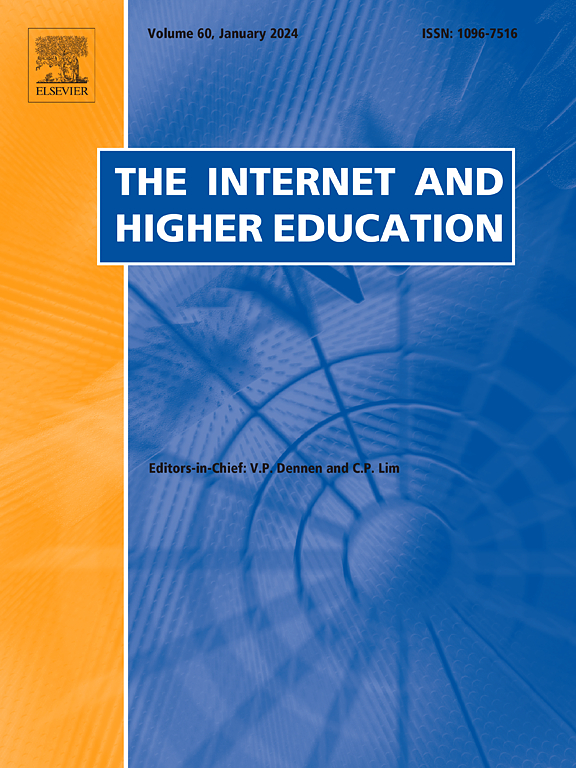Exploratory study of an AI-supported discussion representational tool for online collaborative learning in a Chinese university
IF 6.4
1区 教育学
Q1 EDUCATION & EDUCATIONAL RESEARCH
引用次数: 0
Abstract
With the aid of artificial intelligence (AI), it is more feasible to leverage discussion data to understand the online collaborative learning process. This paper presented an AI-supported discussion representational tool (integrating behavioral and cognitive representations) aimed at enhancing online collaborative learning from three aspects: motivation, cognitive presence, and learning performance. A randomized controlled trial (RCT) was conducted to examine the tool's effectiveness with 122 students in four groups: (1) behavioral representation (n = 31), (2) cognitive representation (n = 31), (3) mixed mode (combining behavioral and cognitive representations, n = 30), and (4) a control group (n = 30). Results indicated that: (1) the discussion representational tool did not significantly enhance students' motivation but led to significant gains in their learning performance compared to the control group; (2) students who learned with the discussion representational tool showed significant improvements in higher-order cognitive presence, ordered network analysis revealed that they generated more higher-level cognitive connections; (3) the motivation is an effective predictor of cognitive presence and learning performance, and discussion representational tool positively moderated the relationship between motivation, cognitive presence, and learning performance. These findings represent a new contribution of the AI-supported discussion representational tool to facilitate online collaborative learning.
中国大学在线协作学习中人工智能支持的讨论表征工具的探索性研究
借助人工智能(AI),利用讨论数据了解在线协作学习过程变得更加可行。本文介绍了一种人工智能支持的讨论表征工具(整合了行为和认知表征),旨在从动机、认知存在和学习成绩三个方面提高在线协作学习。研究人员对 122 名学生进行了随机对照试验(RCT),以检验该工具的有效性,试验分为四组:(1) 行为表征组(n = 31);(2) 认知表征组(n = 31);(3) 混合模式组(结合行为表征和认知表征,n = 30);(4) 对照组(n = 30)。结果表明(1) 与对照组相比,讨论表征工具没有显著提高学生的学习动机,但使他们的学习成绩有了显著提高;(2) 使用讨论表征工具学习的学生在高阶认知存在方面有了显著提高,有序网络分析显示他们产生了更多高层次的认知联系;(3) 学习动机是认知存在和学习成绩的有效预测因素,讨论表征工具对学习动机、认知存在和学习成绩之间的关系起到了积极的调节作用。这些发现代表了人工智能支持的讨论表征工具在促进在线协作学习方面的新贡献。
本文章由计算机程序翻译,如有差异,请以英文原文为准。
求助全文
约1分钟内获得全文
求助全文
来源期刊

Internet and Higher Education
EDUCATION & EDUCATIONAL RESEARCH-
CiteScore
19.30
自引率
4.70%
发文量
30
审稿时长
40 days
期刊介绍:
The Internet and Higher Education is a quarterly peer-reviewed journal focused on contemporary issues and future trends in online learning, teaching, and administration within post-secondary education. It welcomes contributions from diverse academic disciplines worldwide and provides a platform for theory papers, research studies, critical essays, editorials, reviews, case studies, and social commentary.
 求助内容:
求助内容: 应助结果提醒方式:
应助结果提醒方式:


